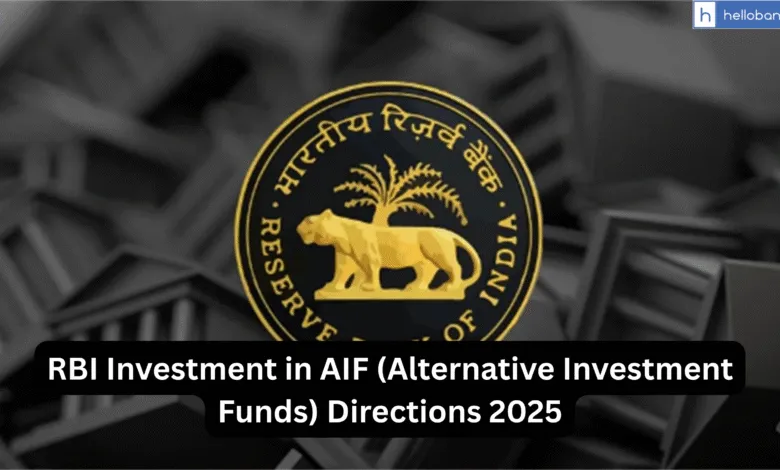RBI Investment in AIF (Alternative Investment Funds) Directions 2025

The Reserve Bank of India (RBI) had earlier issued two circulars—dated December 19, 2023, and March 27, 2024—providing regulatory guidelines for investments made by its Regulated Entities (REs), such as banks and financial institutions, in Alternative Investment Funds (AIFs).
These guidelines were aimed at ensuring transparency, due diligence, and prudent risk management in such investments. However, after receiving feedback from the industry and considering recent regulatory developments by the Securities and Exchange Board of India (SEBI)—particularly regarding due diligence on AIFs and their investors—the RBI has now reviewed these existing guidelines.
In light of this review, and using its authority under various legal provisions such as Sections 21 and 35A of the Banking Regulation Act, 1949, Section 56 of the same Act, Chapter IIIB of the RBI Act, 1934, and Sections 30A, 32, and 33 of the National Housing Bank Act, 1987, the RBI has issued updated directions. These revised guidelines are considered necessary and appropriate in the public interest and are intended to strengthen the regulatory framework for REs investing in AIFs.
These Directions shall be applicable to investments by the following REs in units of AIF Schemes:
- Commercial Banks (including Small Finance Banks, Local Area Banks and Regional Rural Banks)
- Primary (Urban) Co-operative Banks/ State Co-operative Banks/ Central Co-operative Banks
- All-India Financial Institutions
- Non-Banking Financial Companies (including Housing Finance Companies)
Limits on Investments and Provisioning
- No RE shall individually contribute more than 10 per cent of the corpus of an AIF Scheme.
- Collective contribution by all REs in any AIF Scheme shall not be more than 20 per cent of the corpus of that scheme.
- If a RE contributes more than five per cent of the corpus of an AIF Scheme, which also has downstream investment (excluding equity instruments) in a debtor company of the RE, then the RE shall be required to make 100 per cent provision to the extent of its proportionate investment in the debtor company through the AIF Scheme, subject to a maximum of the direct loan and/ or investment exposure of the RE to the debtor company.
- Notwithstanding the provisions of paragraph 6(c), if a RE’s contribution is in the form of subordinated units, then it shall deduct the entire investment from its capital funds – proportionately from both Tier-1 and Tier-2 capital (wherever applicable).
Exemptions
- Outstanding investments or commitments of a RE, made with prior approval from the Reserve Bank under the provisions of Master Direction – Reserve Bank of India (Financial Services provided by Banks) Directions, 2016, are excluded from the scope of paragraphs 6(a) and 6(b) of these Directions.
- The Reserve Bank may, in consultation with the Government of India, by a notification, exempt certain AIFs from the scope of the existing circulars and the revised Directions (except for paragraph 5 – “General Requirement” of these Directions).
- RBI Directions AIF 2025
- Investments in Alternative Investment Funds (AIFs) 19.12.2023
- Investments in Alternative Investment Funds (AIFs) 27.03.2024
